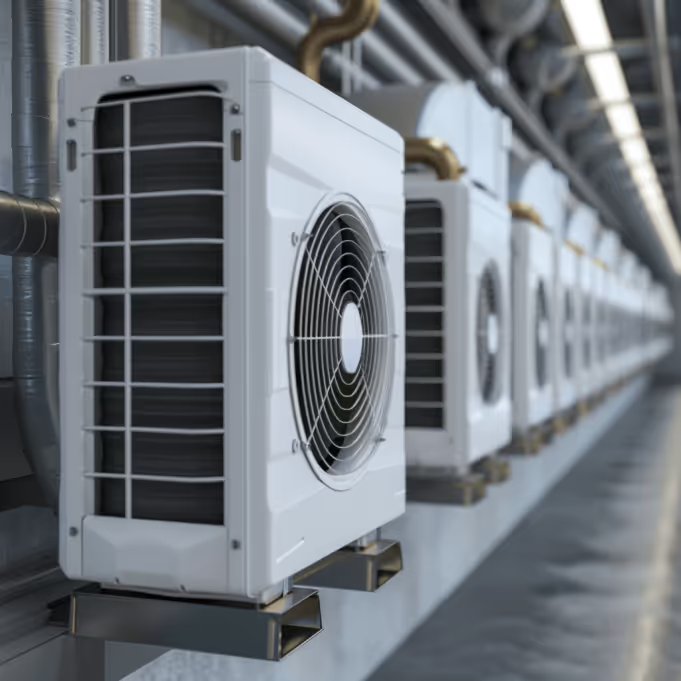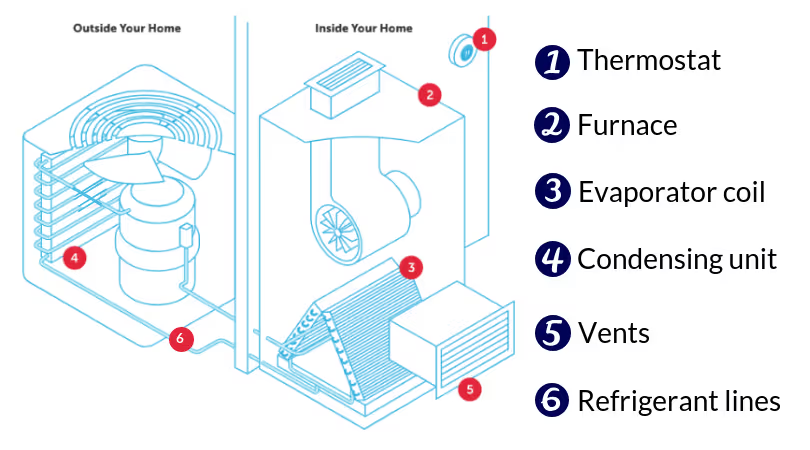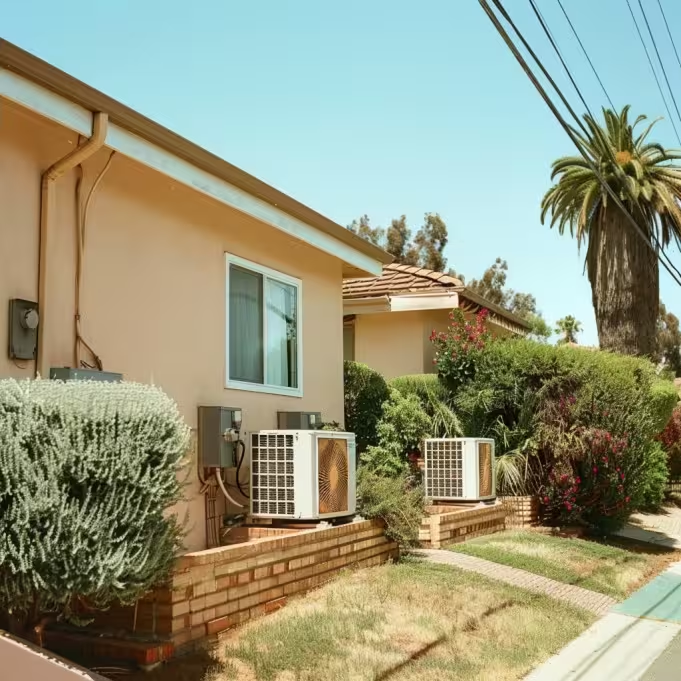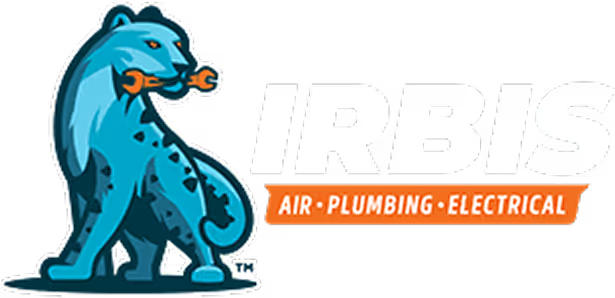Introduction
In the world of indoor climate control, the terms “HVAC” and “AC” often swirl around in a breeze of confusion. Are they the same thing, or do they refer to completely different systems? As you stand on the brink of making decisions about heating and cooling your space—whether it’s a cozy suburban home, a bustling office, or a sprawling commercial complex—the distinction between these systems becomes not just technical jargon but essential knowledge for ensuring comfort and efficiency.
HVAC, which stands for Heating, Ventilation, and Air Conditioning, encompasses a broad range of systems that do more than just cool your space; they can heat, filter, and continuously refresh the air you breathe. On the other hand, standalone AC units might seem like a one-trick pony dedicated solely to keeping the summer heat at bay. However, modern technology blurs these lines, making the choice between HVAC and AC units a pivotal one.
Join us as we demystify these terms, shedding light on their functionalities, differences, and why understanding these distinctions can significantly impact both your comfort and your utility bills. This isn’t just about staying cool or keeping warm; it’s about making informed decisions that suit your specific needs, enhance your living or workspaces, and optimize your energy consumption for years to come.
What is HVAC?
When you hear “HVAC,” you’re diving into the comprehensive world of Heating, Ventilation, and Air Conditioning. This system does more than fiddle with the thermostat; it’s an integral part of maintaining a comfortable, safe, and healthy environment in homes and buildings alike.

Explanation of Heating, Ventilation, and Air Conditioning (HVAC)
HVAC systems are engineered to tackle three core tasks:
- Heating: Providing warmth to your indoor spaces during cold months through devices like furnaces or heat pumps.
- Ventilation: Ensuring fresh air circulates throughout indoor spaces while removing stale air and managing moisture levels. This is crucial not only for comfort but also for preventing mold growth and maintaining indoor air quality.
- Air Conditioning: Cooling down indoor environments during hot weather to maintain comfort levels.
Components of an HVAC System

A typical HVAC system includes several key components that work together to ensure your home or office remains comfortable throughout the year:
- Thermostat: This is the system’s control center, set on a wall in a frequently used area, allowing you to control the temperature and manage other settings.
- Furnace: The powerhouse of the heating system, the furnace heats air, which is then distributed throughout the building.
- Air Conditioner: Works by pulling hot air from inside the home, cooling it down, and redistributing the cooler air.
- Ductwork: These are the passageways through which heated or cooled air travels throughout your home.
- Vents: The outlets from which the air pushed by the HVAC system enters each room.
- Evaporator and Condenser Coils: Crucial for the air conditioning process, these coils cool the air as it passes through with the help of a refrigerant.
Functionality and Capabilities
The beauty of an HVAC system lies in its versatility. Not only does it adjust temperatures to keep you warm in winter and cool in summer, but it also plays a pivotal role in enhancing air quality. It achieves this through filters that trap dust, pollen, and other allergens to provide a cleaner breathing environment.
Moreover, with advancements in technology, many modern HVAC systems come equipped with humidity control functions, smart thermostats that learn your preferences, and even zoning capabilities that allow different areas in a space to be heated or cooled to different temperatures.
In essence, an HVAC system is not just about heating or cooling. It’s a comprehensive solution designed to make indoor spaces livable and pleasant, no matter what the weather outside is doing. Understanding how does hvac system work is key to optimizing your home’s comfort and efficiency, ensuring you stay warm when it’s freezing outside, cool during a heatwave, and fresh all year round.
What is Air Conditioning?
In the quest for a cooler indoor environment, especially during those sweltering summer months, air conditioning (A/C) units are your best allies. But what exactly constitutes an AC unit, and how does it differ from the more complex HVAC system? Let’s break it down into simple terms.

Definition of Standalone Air Conditioning Units
Air conditioning units are specifically designed to reduce the temperature and adjust the humidity in your indoor environment. Unlike HVAC systems, which handle heating, ventilation, and air conditioning, standalone A/C units focus solely on cooling. They work by removing heat from inside your space and releasing it outside, thus cooling the air that remains inside.
How A/C Units Differ from HVAC Systems
The main difference between A/C units and HVAC systems is their range of functions:
- A/C Units: These are primarily designed to cool an area and may have some features to help with dehumidifying.
- HVAC Systems: These are more comprehensive and can heat, cool, ventilate, and control the humidity levels in your environment.
A/C units are generally simpler, focusing solely on cooling, whereas HVAC systems are multi-functional, making them suitable for use throughout the year under varying climatic conditions.
Types of AC Units Available
A/C technology has evolved, and there are now several types of air conditioning units that cater to different needs and spaces:
- Central Air Conditioning: This system uses a network of ducts to distribute cool air throughout your home or building. It’s ideal for cooling multiple rooms at once and is commonly used in larger residential and commercial spaces. When asking what is central air, it refers to this type of system that provides uniform cooling across the entire structure.
- Window Units: These are compact units that fit within a window frame. They are perfect for cooling single rooms and are a popular choice for small apartments or specific areas in a home.
- Ductless Mini-Splits: Combining elements of central and window units, ductless mini-splits consist of an outdoor compressor and one or more indoor air handling units. These are connected by a small conduit rather than ductwork. Mini-splits are versatile, energy-efficient, and provide individual temperature control for different rooms.
Each type of A/C unit offers distinct advantages depending on your specific cooling needs. Central A/C systems are great for whole-home cooling, window units offer a more affordable solution for single rooms, and ductless mini-splits provide a flexible and efficient option for homes without existing ductwork or for additions to your space.
Understanding these differences and the types of A/C units available will help you make an informed decision about the best way to keep your space cool and comfortable during the hotter days of the year. Whether you need a simple solution for a small room or a more robust system for a large space, there’s an air conditioning unit that’s right for your needs.
Differences Between HVAC and A/C
When deciding between an HVAC system and a standalone air conditioning unit, it’s crucial to understand the key differences that will impact not only your immediate comfort but also your long-term costs and energy usage. Here’s a detailed look at the distinctions HVAC vs AC:

Cost Considerations
- Initial Investment: Typically, installing an HVAC system involves a higher upfront cost compared to a standalone A/C unit. This is due to the complexity of the system, which includes heating, cooling, and ventilation components.
- Long-Term Maintenance: HVAC systems, due to their complexity and the fact they are used year-round, often incur higher maintenance costs. Regular check-ups are crucial to keep the system running efficiently and to prevent costly repairs. Conversely, A/C units, while simpler and cheaper to maintain, might only be used seasonally, which can reduce their wear and tear.
- Operational Costs: The cost of running an HVAC system can be higher due to its multiple functions. However, this can be mitigated by choosing energy-efficient models and utilizing programmable thermostats to better control usage. For A/C units, the operational cost is generally lower but can add up if the unit is used extensively or is an older, less efficient model.
Understanding these differences between HVAC and air conditioning will guide you in choosing the right system based on your specific needs, the climate you live in, and your budget. Whether it’s the expansive capability of an HVAC system or the focused cooling power of an A/C unit, both options provide valuable solutions to maintaining comfort in your home or business.
In summary, when comparing HVAC vs AC, it’s important to consider your climate, usage patterns, and long-term cost implications. Is HVAC air conditioning? Not exactly—HVAC systems encompass heating, ventilation, and air conditioning, offering a more comprehensive approach to indoor climate control, while standalone A/C units focus solely on cooling.
Pros and Cons
When choosing between HVAC systems and standalone A/C units, weighing their advantages and disadvantages can help you make a more informed decision that suits your specific needs and circumstances. Here’s a breakdown of the pros and cons for each system:
Comparison of HVAC Systems and Standalone AC Units

Choosing between an HVAC system and a standalone A/C unit largely depends on your specific needs, the climate you live in, and your budget. HVAC systems offer a more integrated solution with benefits for air quality and comprehensive climate control, ideal for homeowners who want a single system to manage all aspects of the indoor air environment. Standalone A/C units, meanwhile, provide a more straightforward, cost-effective solution for cooling, suitable for those with simpler needs or smaller spaces. By considering these pros and cons, you can select the system that best aligns with your requirements for comfort, efficiency, and cost.
Choosing Between HVAC and Air Conditioning
Deciding between an HVAC system and a standalone A/C unit involves considering several key factors to ensure that the choice aligns with your specific needs, preferences, and circumstances. Understanding these factors can help you make a decision that optimizes comfort, cost-efficiency, and functionality in your living or working environment.
Factors to Consider When Selecting the Right System
- Climate: The climate of your location is a primary consideration. If you live in an area with extreme seasonal variations, an HVAC system may be necessary to handle both heating and cooling efficiently. For regions that experience mild weather, particularly those with hot summers and mild winters, a standalone A/C unit might suffice.
- Building Size and Layout: Larger homes or buildings with multiple rooms may benefit more from an HVAC system, which can efficiently circulate air throughout the space via ductwork. In contrast, a smaller home, apartment, or a single room might be adequately served by a standalone A/C unit.
- Energy Efficiency: Consider the energy efficiency of both systems. HVAC systems, especially newer models, are designed to be highly efficient and may offer better long-term savings on energy bills despite higher upfront costs. Standalone A/C units can also be efficient but might not provide the same level of energy savings as a modern HVAC system.
- Installation and Maintenance Costs: Evaluate the initial installation costs and ongoing maintenance requirements. HVAC systems generally require a higher initial investment and can be more costly to maintain. In comparison, standalone A/C units typically have lower installation and maintenance costs.
- Air Quality Needs: If improving indoor air quality is a priority, an HVAC system might be preferable because it integrates ventilation that helps reduce indoor pollutants. Standalone A/C units do not generally improve air quality to the same extent.
Examples of Scenarios Where HVAC or AC Might Be Preferred
HVAC Preferred:
- Multi-story Homes: In homes with multiple floors and extensive square footage, an HVAC system can provide consistent heating and cooling on all levels.
- Regions with Harsh Winters and Hot Summers: Places with significant temperature fluctuations throughout the year will benefit from the dual functionality of an HVAC system.
- Homes with Existing Ductwork: If your home already has ductwork in place, installing an HVAC system may be more cost-effective and straightforward.
AC Preferred:
- Small Apartments or Single Rooms: A window or portable A/C unit can effectively cool a small area without the need for extensive installation.
- Mild Climates: In areas where the temperature rarely dips very low, an AC unit may be all that’s needed to maintain comfort during warmer months.
- Budget Constraints: If initial cost is a major concern, a standalone A/C unit can provide a more affordable solution for cooling without the expense of a full HVAC installation.
By carefully weighing these factors and considering your specific scenario, you can make a well-informed decision that meets your climate control needs efficiently and economically. Whether you opt for a comprehensive HVAC system or a simpler A/C unit, the right choice will ensure your indoor environment is comfortable, manageable, and cost-effective year-round.
Conclusion
Choosing between an HVAC system and a standalone A/C unit is a decision that impacts not only the comfort of your indoor environment but also long-term energy costs and maintenance commitments. Each system offers distinct advantages that are best suited to specific circumstances and needs. By understanding the key differences between HVAC vs AC and evaluating your own requirements, you can select a system that not only fits your immediate comfort needs but also aligns with your financial and energy-efficiency goals.
For those living in areas with extreme seasonal changes, an HVAC system provides a seamless, all-encompassing solution for heating, cooling, and air quality. It represents a comprehensive investment in your home’s functionality and comfort. On the other hand, a standalone A/C unit might be the perfect fit for smaller spaces or milder climates, offering effective cooling without the complexity and cost of a full HVAC system.
Ultimately, the choice between HVAC and air conditioning should be guided by thoughtful consideration of your living or working environment, budget, and personal preferences. As technology advances, the options will continue to expand, providing even more customized solutions to meet individual needs. Remember, the best system is the one that ensures comfort, enhances your space’s usability, and fits into your lifestyle seamlessly. Whether you choose an HVAC or a standalone A/C system, make sure it’s a decision that keeps you comfortable and happy in your environment year-round.
FAQ
What is the main difference between HVAC and A/C?
The primary difference lies in their scope and functionality. HVAC (Heating, Ventilation, and Air Conditioning) systems provide comprehensive climate control—offering heating, cooling, and ventilation. In contrast, A/C (Air Conditioning) units are designed solely for cooling. HVAC systems can adjust the indoor temperature regardless of outdoor conditions, and ensure air quality within a space, whereas A/C units focus only on reducing the indoor temperature during warmer periods.
Are standalone A/C units the same as HVAC systems?
No, standalone A/C units are not the same as HVAC systems. Standalone A/C units are part of the broader HVAC family but are limited to cooling functions. HVAC systems, however, are more complex and provide heating, cooling, and ventilation to maintain comfortable indoor air quality and temperature throughout the year.
Which is more energy-efficient, HVAC or A/C?
The energy efficiency can vary significantly between the two systems and depends on several factors including the model, installation, and the specific energy needs of the property. Generally, modern HVAC systems are designed to be highly energy efficient, utilizing advanced technologies to minimize electricity usage across heating, cooling, and ventilation. Standalone A/C units can also be energy-efficient but are typically only used for cooling.
What are the advantages of HVAC systems over standalone A/C units?
HVAC systems offer several advantages:
- Year-Round Comfort: They can heat and cool, making them suitable for use in all seasons.
- Improved Air Quality: HVAC systems include ventilation that helps reduce indoor pollutants and manage humidity levels.
- Energy Efficiency: Many HVAC systems come with energy-saving settings and controls that standalone A/C units do not provide.
- Increased Property Value: Properties with full HVAC systems often have higher market values due to their enhanced comfort and energy features.
Which option is better for residential properties: HVAC or A/C?
The better option depends on the climate, the size of the property, and homeowner preferences. For areas with extreme weather conditions, an HVAC system may be more appropriate because it can handle both heating and cooling. In regions with mild temperatures and minimal heating requirements, a standalone A/C unit might be sufficient.
Can I upgrade from an AC unit to an HVAC system?
Yes, upgrading from an A/C unit to an HVAC system is possible and can be a practical choice for enhancing indoor comfort and utility efficiency. This upgrade typically involves installing additional equipment like a furnace and ductwork if not already in place, and possibly enhancing the existing air conditioning components. Consulting with a professional HVAC installer is recommended to determine the best approach for your specific situation and to ensure that the new system is properly sized and installed.




.avif)













